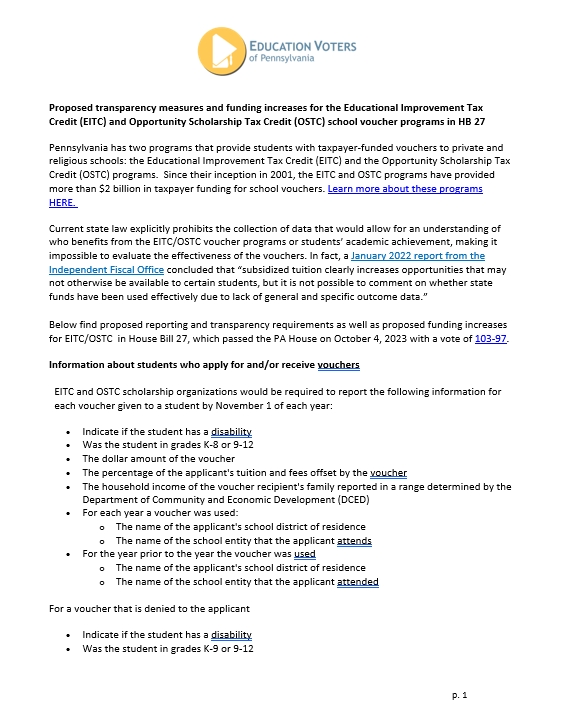n 2001, Pennsylvania enacted the Educational Improvement Tax Credit (EITC) school voucher program and funded it with $20 million. Over the past 20+ years, state lawmakers implemented a second school voucher program, the Opportunity Scholarship Tax Credit program (OSTC), and increased funding for school vouchers seventeen fold, to a whopping $340 million in 2022-2023.
Click HERE to learn more about Pennsylvania’s Educational Improvement Tax Credit (EITC) and Opportunity Scholarship Tax Credit (OSTC) voucher programs.
Pennsylvania has spent more than $2 billion on school vouchers for private and religious schools since 2001. By any standards, $2 billion is *a lot* of money and one would imagine that state lawmakers would want to be able evaluate the programs.
Alas, the opposite is true in Harrisburg.
Current state law explicitly prohibits the collection of data that would allow for an understanding of who benefits from the EITC/OSTC voucher programs or students’ academic achievement, making it impossible to evaluate the effectiveness of the vouchers.
In fact, a January 2022 report from the Independent Fiscal Office concluded that “subsidized tuition clearly increases opportunities that may not otherwise be available to certain students, but it is not possible to comment on whether state funds have been used effectively due to lack of general and specific outcome data.”
House Bill 27, the school code bill that passed out of the House last week with a bipartisan vote of 106-97, proposes to take a first and small step toward increasing transparency for the EITC/OSTC programs by requiring additional reporting by scholarship organizations.
Click HERE for details about the proposed transparency measures for EITC/OSTC in House Bill 27.

HB 27 also proposes a whopping $120 million (35%) increase in funding that would increase the total funding for school vouchers in Pennsylvania to $460 million PER YEAR.
Ed Voters’ position is that there should be no additional funding for private and religious school vouchers before public schools are fully and constitutionally funded. In addition, we believe that before new funding is put into any voucher program, the legislature must be able to demonstrate, based on data, that the current $340 million/year expenditure by the EITC and OSTC programs is producing positive educational outcomes for students.
However, we understand that with a divided government, nothing happens without compromise and and we recognize that the transparency measures in House Bill 27 take an important step toward creating minimal and critically-needed transparency for the EITC/OSTC voucher programs.
We also know that many school-privatization-supporting lawmakers and billionaire-backed pro-voucher front groups will fight tooth and nail against *any* transparency or accountability for the EITC/OSTC voucher programs. They are clearly concerned about what any additional data on the programs will show….

We expect the PA Senate to come back in session on Monday, October 16th and take up House Bill 27 at some point after that. We will be following the bill closely and will update you with any movement on the issues of transparency and funding for school vouchers in Pennsylvania.
We are deeply grateful for your continued support of public education and your willingness to invest time in learning about the EITC/OSTC school voucher programs.
We expect that pro-school privatization lawmakers will be pushing hard for a new and extremely damaging school voucher program similar to the Lifeline/PASS programs that we defeated in June.
Having a group of statewide advocates who understand the current voucher programs and who can articulately advocate against enacting a new, duplicative and worse voucher program is going to be critical in helping us continue this fight moving forward.

Recent Comments